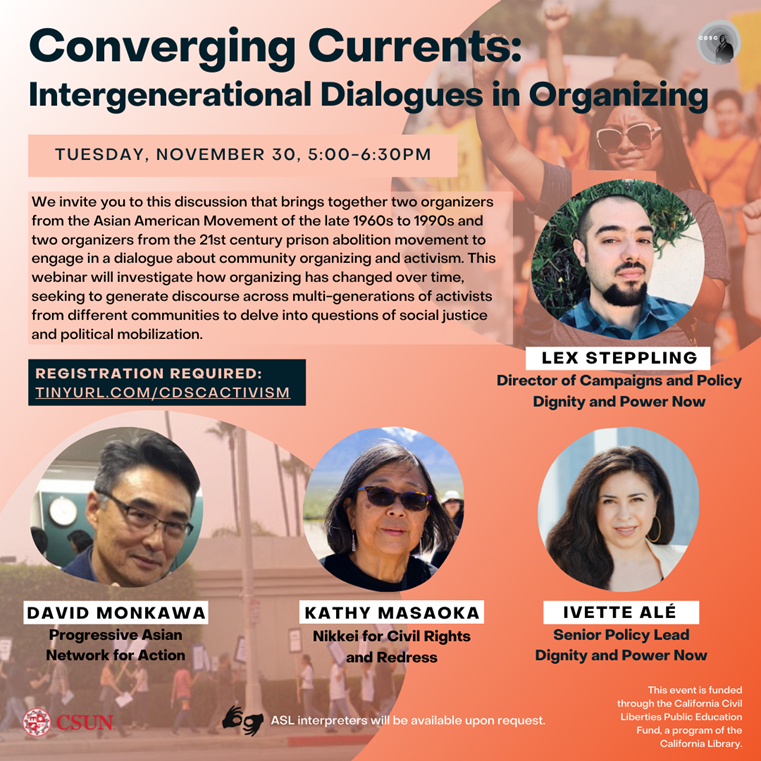This webinar brings together two community organizers from the Asian American Movement of the late 1960s to 1990s and two organizers from the 21st century prison abolition movement to engage in a dialogue about community organizing and activism. In addition to asking how these organizers became involved in organizing, how their involvement in activism has changed over time, what is the meaning of solidarity and liberation to these organizers, this webinar investigates fundamentally how organizing has changed over time from the late 1960s to the present? Thus, this webinar seeks to generate dialogue across different generations of activists and from different communities to delve into questions of social justice and political mobilization.
Speakers:
David Monkawa, Progressive Asian Network for Action: David Monkawa immigrated to the US with his family from Japan and grew up in the Crenshaw district of Los Angeles. He became a workplace labor organizer in healthcare, warehousing and a foam rubber plant becoming a member of unions such as SEIU, United Rubber Workers and AFSCME. David also remained active in the Japanese American community. He served as Co-Chair of the Nikkei for Civil Rights and Redress, one of 3 groups who successfully fought for redress and reparations for JAs who were thrown into US concentration camps in WW2. David has been a socialist and activist for system-change for many years and has published articles in Eastwind Magazine, AsAm, LA Progressive, Change-links and Japanese American publications. He is currently the Co-Chair of Save Our Seniors Network which advocates for the rights of seniors. And is one of the founders of the Neighborhood Safety Companions which formed to protect seniors from anti-Asian violence.
Kathy Masaoka, Nikkei for Civil Rights and Redress: Kathy Nishimoto Masaoka was born and raised in multicultural Boyle Heights. The Vietnam War and Asian American Studies at University of California, Berkeley in the late ’60s were important influences on her values. Since the 1970s, she has worked on youth, workers, and housing issues in Little Tokyo, and Japanese American redress. Currently Co-chair of the Nikkei for Civil Rights & Redress (NCRR), she served on the Editorial Team for the book, NCRR: The Grassroots Struggle for Japanese American Redress and Reparations, helped to educate about the camps through the film/curriculum, Stand Up for Justice, and worked on the NCRR 9/11 Committee to help build relationships with the American Muslim community through programs like Break the Fast and Bridging Communities. She represented NCRR to support the rights of Korean and other minorities in Japan and is involved with Nikkei Progressives, Vigilant Love, and the Sustainable Little Tokyo project, and working on issues such as reparations for Comfort Women and Black folks, the rights of immigrants, and Little Tokyo’s future.
Lex Steppling, Director of Campaigns and Policy, Dignity and Power Now: Lex has spent his life organizing around issues pertaining to state violence from an abolition and public health lens. Nationally, Lex has organized to build a holistic organizing strategy to de-silo the fight to dismantle systems of state violence. Locally, he helped build the Justice LA Coalition– which successfully stopped L.A County’s planned 4 billion dollar jail expansion plan, and became the driving force behind the Alternatives to Incarceration vision, and foundation of Measure J. While special interests like the probation lobby spent over $10 million to pass Proposition 25 (which would allow judges to use biased risk assessment instruments and electronic monitoring) Lex led the campaign to successfully stop that measure, and work with broad coalition to develop an alternative, community-based pretrial vision.

